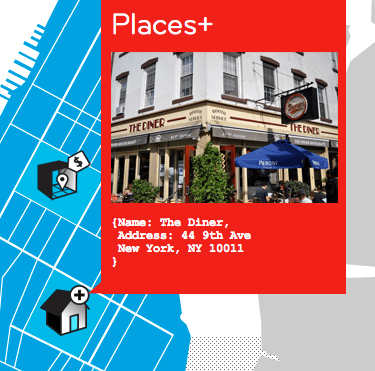New York-based startup Hyperpublic has some big news today that should catch the eye of developers looking to do anything with local: they’re opening access to a new Point of Interest (POI) database called Places+, and they’re also giving developers a straightforward and easy way to start monetizing. All free of charge.
Founder Jordan Cooper, who is also a Venture Partner at Lerer Ventures, walked me through each of the releases. He says that Hyperpublic has offered some location APIs before, but that they were small potatoes compared to what they’re bringing to the table now.
The Places+ product will be competing with the likes of Factual and Foursquare’s location database (each database allows mobile apps to display which restaurants and other venues are near a given location). But Cooper says that Places+ contains a superset of its competitors’ data — and he thinks that it has fresher data to boot.
So where does Hyperpublic get that data? Cooper says that the service has an approach that’s similar to Google’s: it’s constantly monitoring a variety of publicly accessible data sources, both to establish where POIs are located and to see if they’re fresh (for example, it might look at recent status updates to see if people have mentioned a given venue, which would obviously indicate that it’s probably still around). At this point the service has a high density of information for over fifty major cities and counting. Obviously Cooper is making some pretty bold claims; time will tell if the Places+ is better in practice than the other POI databases available.

The next product is called Geo Deals & Events. This takes of advantage of the fact that there are a lot of local businesses running deals in your area at any given time, through myriad services like Groupon, LivingSocial, and others. Hyperpublic is aggregating all of these deals and making it easy for developers to display them from within their applications (so, for example, a restaurant review app could display a Groupon for a nearby steakhouse). Better yet, developers keep 100% of the affiliate fee associated with driving users to each deal — Hyperpublic isn’t charging anything.
Finally, Hyperpublic is now allowing developers to request certain types of data. Say you were building an app and wished you could access a database of every nearby water fountain. If Hyperpublic wasn’t already making that data accessible via an API, you could ask them to do so (provided they had the data). If the service doesn’t already have the data, it will get in touch with other developers on the platform who might.
So how is Hyperpublic going to sustain itself, given that it isn’t charging for anything? Cooper explains that in the longer term, the company will be launching an ambitious location-based search engine that goes well beyond the local search you see today — the idea is that you’ll be able to search for specific objects, rather than just venues. But to get there the service needs a lot of data, so it’s opening its doors to developers, who will both access and contribute to Hyperpublic’s growing databases.
In addition to its APIs, Hyperpublic also builds products using its own data (in a sense, they’re dogfooding their stuff). You can see some of these projects right here. The company raised $1.2 million earlier this year.
